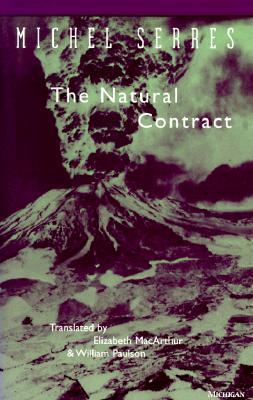Michel Serres: The Natural Contract (1990–) [PT, EN]
Filed under book | Tags: · earth, environment, environmental ethics, knowledge, nature, philosophy

“Global environmental change, argues Michel Serres, has forced us to reconsider our relationship to nature. In this translation of his influential 1990 book Le Contrat Naturel, Serres calls for a natural contract to be negotiated between Earth and its inhabitants.
World history is often referred to as the story of human conflict. Those struggles that are seen as our history must now include the uncontrolled violence that humanity perpetrates upon the earth, and the uncontrollable menace to human life posed by the earth in reaction to this violence. Just as a social contract once brought order to human relations, Serres believes that we must now sign a “natural contract” with the earth to bring balance and reciprocity to our relations with the planet that gives us life. Our survival depends on the extent to which humans join together and act globally, on an earth now conceived as an entity.
Tracing the ancient beginnings of modernity, Serres examines the origins and possibilities of a natural contract through an extended meditation on the contractual foundations of law and science. By invoking a nonhuman, physical world, Serres asserts, science frees us from the oppressive confines of a purely social existence, but threatens to become a totalitarian order in its own right. The new legislator of the natural contract must bring science and law into balance.
Serres ends his meditation by retelling the story of the natural contract as a series of parables. He sees humanity as a spacecraft that with the help of science and technology has cast off from familiar moorings. In place of the ties that modernity and analytic reason have severed, we find a network of relations both stranger and stronger than any we once knew, binding us to one another and to the world. The philosopher’s harrowing and joyous task, Serres tells us, is that of comprehending and experiencing the bonds of violence and love that unite us in our spacewalk to the spaceship Mother Earth.”
Originally published in French as Le Contrat Naturel, Editions Francois Bourin, 1990
English edition
Translated by Elizabeth MacArthur and William Paulson
Publisher University of Michigan Press, 1995
Studies in Literature and Science series
ISBN 0472065491, 9780472065493
136 pages
Publisher (EN)
O contrato natural (Portuguese, trans. Serafim Ferreira, 1994, added on 2013-11-22)
The Natural Contract (English, trans. Elizabeth MacArthur and William Paulson, 1995)
Jane Bennett, William Chaloupka (eds.): In the Nature of Things. Language, Politics, and the Environment (1993)
Filed under book | Tags: · cyborg, ecology, environment, environmental ethics, nature, politics

Informed by recent developments in literary criticism and social theory, In the Nature of Things addresses the presumption that nature exists independent of culture and, in particular, of language. The theoretical approaches of the contributors represent both modernist and postmodernist positions, including feminist theory, critical theory, Marxism, science fiction, theology, and botany. They demonstrate how the concept of nature is invoked and constituted in a wide range of cultural projects—from the Bible to science fiction movies, from hunting to green consumerism. Ultimately, it weeks to link the work of theorists concerned with nature and the environment to nontheorists who share similar concerns.
Contributors include R. McGreggor Cawley, Romand Coles, William E. Connolly, Jan E. Dizard, Valerie Hartouni, Cheri Lucas Jennings, Bruce H. Jennings, Timothy W. Luke, Shane Phelan, John Rodman, Michael J. Shapiro, Wade Sikorski.
Publisher U of Minnesota Press, 1993
ISBN 0816623074, 9780816623075
276 pages
Damian F. White: Bookchin. A Critical Appraisal (2008)
Filed under book | Tags: · anarchism, critical theory, deep ecology, democracy, ecology, environmental ethics, marxism, participation, philosophy, political ecology, social theory, urban planning

This is the first comprehensive overview of the work of Murray Bookchin, the left-libertarian social theorist and political ecologist who is widely regarded as the visionary precursor of anti-corporate politics. Bookchin’s writing spans fifty years and engages with a wide variety of issues: from ecology to urban planning, from environmental ethics to debates about radical democracy. Weaving insights from Hegel and Marx, Kropotkin and Mumford, Bookchin presents a critical theory whose central utopian message is ‘things could be other than they are’. This accessible introduction maps the evolution of Bookchin’s project. It traces his controversial engagements with Marxism, anarchism, critical theory, postmodernism and eco-centric thought. It evaluates his attempt to develop a social ecology. Finally, it considers how his thinking relates to current debates in social theory and environmentalism, critical theory and philosophy, political ecology and urban theory. Offering a clear account of Bookchin’s key themes, this book provides a critical but sympathetic account of the strengths and weaknesses of Bookchin’s writing.
Publisher Pluto Press, 2008
Original from the University of Michigan
Digitized Jul 17, 2009
ISBN 0745319645, 9780745319643
Length 236 pages
More info (publisher)
More info (google books)

